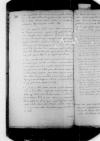Letter #5755
Alfonso de VALDÉS to Ioannes DANTISCUSs.l., [1528-09-01 — 1528-12-16?]
English register:
Valdés praises the epigram Dantiscus sent him as a royal gift, more precious than anything else. He regrets that the old man’s [Mercurino Gattinara’s] “importunate importunity” (importuna importunitas) prevents him from visiting his friend. He asks to be informed about what Cato Pratensis [Lodewijk van Praet] thinks of the epigram.
Manuscript sources:
Auxiliary sources:
Prints:
| ||||||||||||||||||||||
Text & apparatus & commentaryPlain textText & commentaryText & apparatus
Salutem.
Tam magnifica subinde munera mittis, ut nullum mehercle principem, quantumvis magnum, sciam, quocum de liberalitate certare non possis. Misisti epigramma, sed ita, acsi nihil mitteres, et tamen nihil est, quod maius mitti possit. Mittis ingenium, iudicium, argutias, sales, lepores, et quid non? Sed ne ego ineptus sum, qui tua laudem, quasi meo calculo quicquam illis accedere possit?
Vale.
Postscript:
Venirem ad te, si per huius
